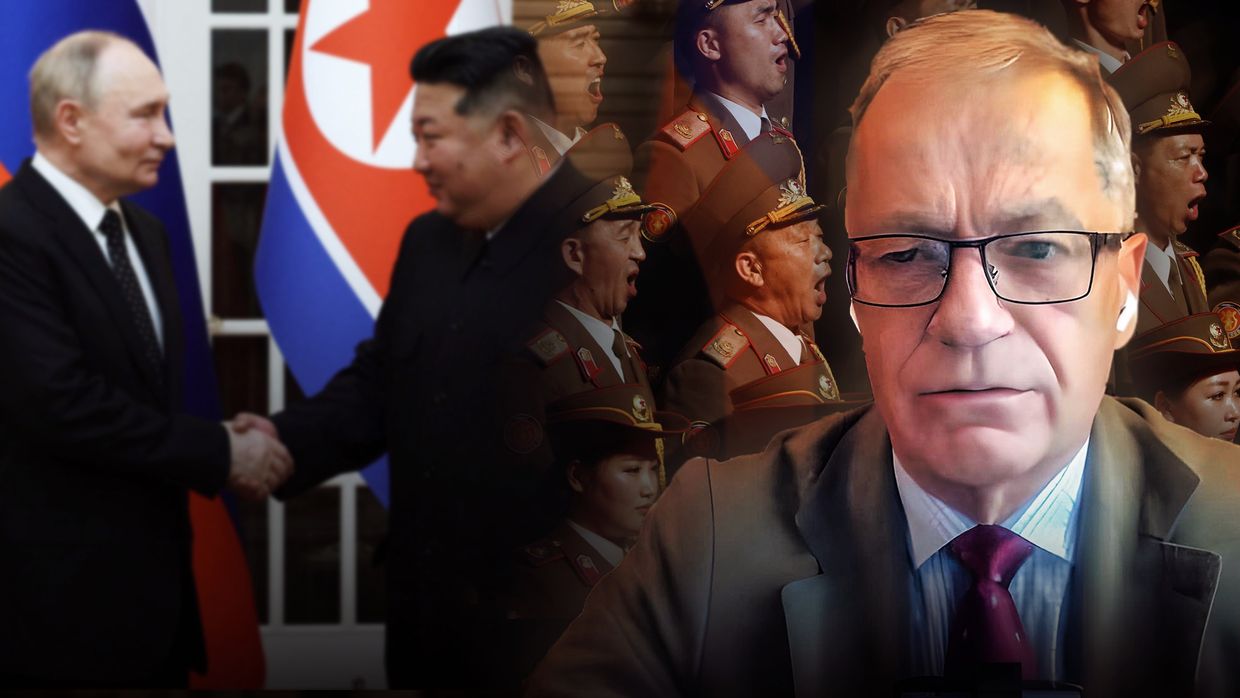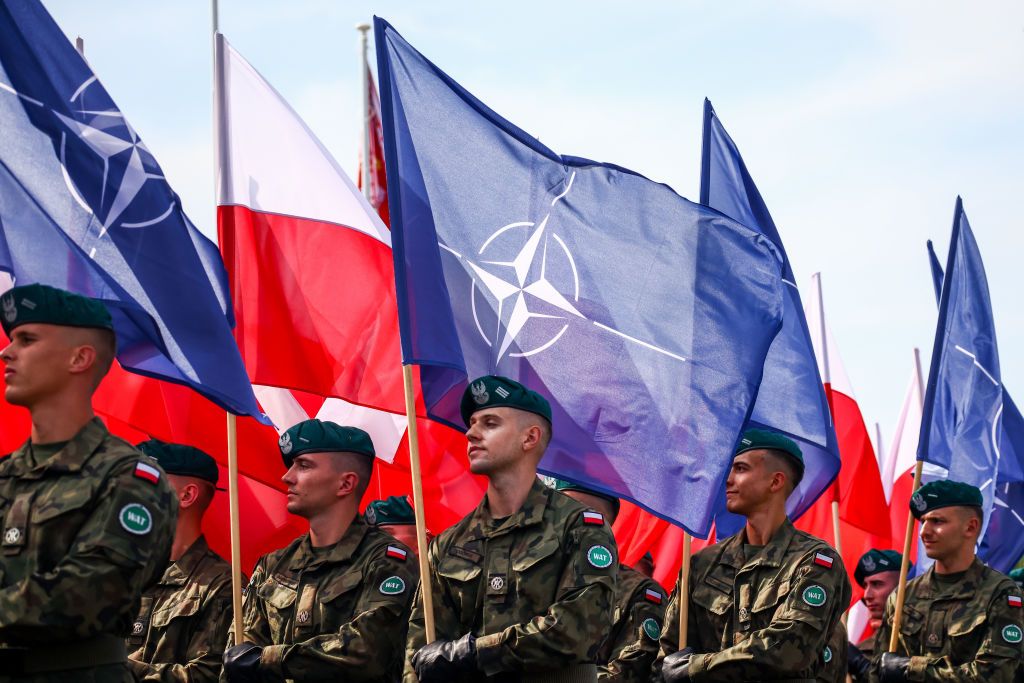China was well aware of North Korean troop deployment ahead of time, expert says
While Beijing claimed to be unaware of Pyongyang's troop movement, some observers believe China has something to gain.

Russian President Vladimir Putin (L) and Chinese President Xi Jinping (R) shake hands during a bilateral meeting in Beijing, China on May 16, 2024. (Contributor/Getty Images)
Beijing was fast at claiming that it had no knowledge of Russia's deepening partnership with North Korea.
The U.S. had jumped on the opportunity, hoping to pressure China to dissuade North Korea from taking an active part in Russia's war against Ukraine.
Observers, however, are skeptical about China's signals, believing that the deal to deploy North Korean troops on Ukrainian battlefields couldn't have passed without Beijing's knowledge.
North Korea's key ally, China, keeps the totalitarian regime of Kim Jong Un afloat. Beijing also provides billions worth of dual-use goods to Russia, having an increasingly important role in Moscow's ability to wage war on Ukraine.
"Contrary to what China says officially… I don't think Pyongyang would have surprised China by sending troops without discussing it before," Mathieu Boulegue, a senior fellow at the Center for European Policy Analysis (CEPA) think tank, told the Kyiv Independent. The expert dismissed Beijing's diplomatic messaging as a "big masquerade."
China and North Korea – close as 'lips and teeth'
Chinese dictator Mao Zedong once said that his homeland and North Korea are as close as "lips and teeth."
North Korea presents a useful buffer zone between China and the U.S.'s allies in East Asia. The collapse of Kim Jong Un's regime would also drive millions of refugees across the Chinese border, creating a significant socioeconomic headache for Beijing.
"Without China's consent, there wouldn't be a North Korean regime," Boulegue said in comments for the Kyiv Independent. Over half a century after Mao's comments, Beijing continues to be Pyongyang's only lifeline.
"Without China's consent, there wouldn't be a North Korean regime"
Business with China represents more than 90% of North Korea's total trade turnover. When the two countries closed their border in 2020 due to the Covid-19 pandemic, North Korea's economy dropped by 4.5%.
But the relationship hasn't always been smooth.
China began nurturing economic ties with South Korea, now Beijing's third-largest trade partner.
Beijing has also shown displeasure with the North Korean nuclear program. China has shown restraint in its nuclear rhetoric and allegedly discouraged Moscow from using nuclear arms.
Bypassing Beijing
On Oct. 31, North Korea tested an intercontinental missile in an ostentatious demonstration of its nuclear capabilities. Pyongyang declared South Korea a "hostile state," renouncing the previous official policy of "peaceful reunification."
Pyongyang has been increasingly relying on Moscow for support.
Ukraine and the U.S. believe that in return for arms and troops, North Korea has obtained financial support for its impoverished economy, as well as technology for its nuclear program. Kim might also welcome the chance to test his fighters on a modern-day battlefield.
According to Ukraine, North Korea has dispatched 12,000 troops to Russia, with the first soldiers expected to join the fight in November.
"The Chinese side is not aware of the situation," Chinese Foreign Ministry spokesperson Lin Jian said.


Moscow and Pyongyang indeed kept Beijing out of the loop, the Chinese leadership has reasons to be displeased.
Jan Svec, a China researcher at the Prague-based Institute of International Relations, says that Beijing may be concerned about a "closer military cooperation of South Korea and Japan with the U.S. and NATO" as a result.
"At the same time, North Korea can become more dependent on Russia, and thus become less dependent on China, leaving China with less leverage," the expert told the Kyiv Independent.
"North Korea wants advanced military and missile technology, but the broader goal of signaling the existence of an anti-Western coalition—which is not going to dissipate—is also important," Edward Howell, a North Korea expert at Oxford University, told the Kyiv Independent.
"Russia has provided North Korea with unwavering support at the U.N. Security Council over the past year, a maneuver that fulfills both Russian and North Korean interests."
According to Howell, "China will not be pleased with North Korea's ongoing claims that its 'number one friend' is Russia."
Yet, Boulegue, who focuses on Russian-Chinese security relations, believes it unlikely that Pyongyang and Moscow would take such escalatory steps without Beijing's tacit approval.
"They (China) probably obtained something from Russia in terms of a trade-off," the expert said. "Another question is: what did they get in return?"
"They (China) probably obtained something from Russia in terms of a trade-off."
Boulegue underscores that despite its diplomatic posturing, China has been indirectly supporting Russia's aggression against Ukraine for years.
While not openly supplying Russia with arms, China is a key partner in Moscow's war, providing it with dual-use goods that keep the Russian arms industry running and helping it withstand Western sanctions.
From Beijing's perspective, such a "proxy war" in Ukraine creates a "cheap and efficient splinter that keeps us (the West) busy" while keeping its hands clean, Boulegue argues.
"And North Korea is definitely part of that indirect strategy."
Beijing sticking with its allies
The main proponents of the idea that China is displeased with North Korea point to Beijing's economic interests in Europe and a desire for regional stability.
China does not shy away from confronting the U.S., especially when it comes to Taiwan. At the same time, China generally avoids antagonizing the EU, enjoying the profitable trade and trying to undermine the bond between the two sides of the Atlantic.
But the West has already named China as the culprit of Russia's war, underscoring the Chinese role during the latest NATO summit. The U.S. and EU have also imposed sanctions against Chinese companies.
Yet, China doesn't seem concerned.

"I don't think that this (the transfer of North Korean troops) is such a decisive step that would lead to some kind of significant change of China's attitude toward North Korea or Russia," Svec believes.
While the U.S. has reportedly appealed to China to dissuade North Korea from sending its troops to fight Ukraine, it is unlikely that this request will be any more successful than the ones made in the past two and half years of the war.
Boulegue says that the West lacks leverage to pressure North Korea through China.
At the same time, the expert argues that the poorly trained and equipped North Korean troops are not going to be any kind of "strategic game changer" on the battlefield. He expects Moscow to keep them mostly in support roles to prevent heavy losses on their part.
Throwing North Korean troops into "human wave" attacks that Russian troops face on a daily basis "is not going to look good for (Russia's) relationship with China and North Korea as well," he concludes.











